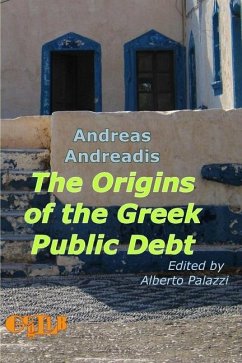This is a story written in 1904, which tells the vicissitudes of the Greek public debt since its own absolute beginning in 1824. At present this book, more than one hundred years old, is also a modern book, in its own way: We do not know today if the new Greek state failure will be driven civilly by the International Banking System and the European Union, or if it will happen more dramatically, in the form of disordered default. In any case, we can call the story once more "une lamentable histoire," as was qualified by a French businessman, who conducted research about the Greek economy with insight and precision back in 1847.Our author, Andreadis, intended to tell us the whole story, including the one of the institution of the International Control in 1897, but the first volume translated here was then the only one, and it tells us about two ancient events: the Independence Loans that the provisional Greek Government contracted with the private market in London in 1824 and 1825, and the loan of an ill-advised entity that the Government of the new state contracted after 1832, remaining indebted to the Governments of the three Protecting Powers: England, France and Russia. The lamentable histoire of this prehistoric part of the story gives us the unique opportunity to understand the structure of a phenomenon of financial catastrophe reduced to its skeleton, almost as if we had been able to make a culture in vitro of it.Andreas AndreadisAndreas Andreadis (1876 - 1935), a native of Corfu, studied law and economics in Paris and London, then taught economics and public finance at the University of Athens. He was an adviser of Eleftherios Venizelos, but he did not want to have political responsibilities, although on several occasions the ministries of Foreign Affairs and Economy had been offered him. He wrote about economic history: History of the Bank of England (1904), Economic History of Greece from antiquity to modern times (1918), and was popular for a long time as theatre critic under the pseudonym Alk.








